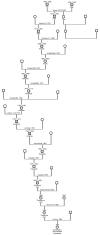|
|
|
|
|
|
|
|
|
|
|
Click for reading article published in "Publico" newspaper, 27/2/2016, by Esther Mucznik |
|
|
|
SHORT INTRODUCTION
The designation of “Sephardic Jews” refers to the descendants of the ancient Jews and traditional Jewish communities of the Iberian Peninsula (Sefarad or Hispania), that is, Portugal and Spain.
The presence of these communities in the Iberian Peninsula goes a long way back, and in fact precedes the formation of the Iberian Christian kingdoms, namely Portugal. Until the 15th century, some Jews occupied very prominent places in Portuguese political and economic life.
Following the Alhambra Edict of 1492 and their persecution by the Spanish Inquisition, a very large number of Spanish Jews sought refuge in Portugal and joined the Portuguese Jewish communities. However, King Manuel I of Portugal, who had initially issued a royal-decree law guaranteeing their protection, ordered in 1496 the expulsion of all Jews that did not convert to Catholicism.
Notorious anti-New Christian riots broke out in 1506, killing up to four thousand in a massacre in Lisbon. After the massacre the crown softened its New Christian stance for a time, allowing migration. In 1515 the king requested to establish an inquisition to systematically persecute New Christians, but it was initially denied by the Pope.
The Portuguese Inquisition was formally established in Portugal in1536 under King João III and, although the last public auto-da-fé took place in 1765, was only extinguished in 1821 when the country went through a constitutionalist insurrection.
The Inquisition focused its attention on New Christians and crypto-Jews. The fact that anyone arrested by the Inquisition was subject to having his property confiscated insured that the campaign was carried out with alacrity. Tribunals were set up in a number of towns in Portugal, but also in the kingdom’s overseas possessions, namely Brazil, Goa and Cape Verde.
According to historian António José Saraiva, 40,000 individuals were charged by the Portuguese Inquisition. Of them, in the mainland venues alone, 1,175 were burned at the stake, and an additional 633 burned in effigy.
Thus, many Sephardic Jews were forced into exile and compelled to leave Portugal from the late fifteenth and early sixteenth century onwards, including those who had converted to Catholicism – the conversos, also known as New Christians, Anusim or Marranos. Some hid their practice of Judaism over the years and are generally designated as secret, hidden or crypto-Jews.
Portuguese Jews and New-Christians who managed to escape, settled in several Mediterranean countries like Morocco, France, Italy, Croatia, Greece, Turkey, Syria, Lebanon, Israel, Jordan, Egypt, Libya, Tunisia and Algeria, Northern Europe cities such as London, Nantes, Paris, Antwerp, Brussels, Rotterdam, Amsterdam, Glückstadt, Hamburg or Cologne and other countries like Brazil, Argentina, Mexico, Antilles and the US, among others.
Despite the expulsion and the persecution of their ancestral territory, they have kept, along with their descendants, not only the Portuguese language, in some cases, but also the traditional rites of the ancient Jewish worship in Portugal, saving their surnames over generations, objects and documents proving their Portuguese origin, along with a strong memorial connection to Portugal. Consequently, they are often referred to as “Portuguese Jews” or “Jews of the Portuguese Nation”.
Considering this historical heritage, the Portuguese Citizenship Act (Lei da Nacionalidade) was amended as to permit the acquisition of Portuguese citizenship by the descendants of Portugal's Sephardic Jews.
All the legal requirements regarding the application of descendants of Sephardic Jews of Portuguese origin for Portuguese nationality (through naturalization) are clearly stated in the Portuguese Decree-Law 30-A/2015, of February 27th, 2015. Applications should be presented at the Central Registry Offices (Conservatória dos Registos Centrais) in Lisbon, in diplomatic services, and the Portuguese Minister of Justice was invested the power of granting nationality.
STEP 1 - APPLYING FOR CERTIFICATION AT THE JEWISH COMMUNITY OF LISBON (CIL)
In view of the difficulties that may arise while checking the findings concerning historical and genealogical evidence, the Decree-Law allows Portuguese Jewish Communities - duly registered locally under the status of religious legal entities, that is, the Jewish Communities of Lisbon (CIL) and Porto (CIP) – to issue valid certificates. Further, there seems to be no other alternative but to start the process by requiring the certification of direct or collateral progeny, family relationship to a Sephardic community of Portuguese origin and the tradition of belonging to a Sephardic community of Portuguese origin from a Portuguese Jewish community.
The Jewish Community of Lisbon has made available:
1. Administration staff – to answer all questions, receive and perform a pre-check of the documentation. You’ll find all the contacts below. 2. A Committee of Experts in Jewish Sephardic genealogy and the historical routes of the Jewish Iberian Diaspora – to evaluate the provided means of proof. 3. A Certification Committee – to issue the certificates to be mailed to the applicants or to their legal representatives.
The “burden of proof” rests on the applicant, who must provide as much evidence as possible, of all kinds, showing direct or collateral progeny and the tradition of belonging to a Sephardic community of Portuguese origin. In fact, since a very large number of Spanish Jews migrated to Portugal when they were expelled from Spain, proving Spanish ancestry from families known to have lived in Portugal is also acceptable. Mind that our internal Experts’ Committee checks the information provided but does not run genealogical studies itself.
Administrative documents
1. Filling and signing in good faith an application form with all the required personal details, including the place of residence. 2. A simple copy of a valid passport (page containing personal data, picture and signature). 3. A birth certificate (including name and parents’ name, proof of name changes when applicable, place and date of birth). 4. A valid and specific power of attorney (when not presented by the applicant himself).
Means of proof
Applicants are expected to provide different means of proof and it is understood that they will not be the same in each particular case and some people won’t be able to provide all of them:
1. Personal – family name, records and documents (including image, video and audio) of family ceremonies, weddings, burials, registration at Jewish communities, birth certificates, property deeds, bibliography and book quotes, copies of inquisition archives and alike.
2. Genealogical – According to the new orders from
Conservatória dos Registos Centrais, from today on, 1st of February
2018, the certificates issued by the Jewish communities must be
followed by the applicant’s genealogical tree. Therefore, the
tradition of Sephardic Jewish belonging certification solicitude for
granting Portuguese nationality must be also accompanied by a
genealogical tree having indications of dates and places of
ancestor’s birth, death and marriage.
We propose two possible models, attached at this
e-mail: http://cilisboa.org/documents/Model%20B%20Genealogical%20Tree%20Txt%20ENG%20edit.docx
3. Testimonial – to be provided either/or by external experts, your Sephardic community’s rabbi, people who know the applicant, etc.
4. Emotional memory – we expect the applicant to explain in short his motivation to apply for Portuguese nationality based on his Sephardic family and tradition roots. A simple letter will do. If/when possible, evidence of some level of ladino speaking proficiency/culture will be highly appreciated although it’s not a must.
All the above may be presented in Portuguese, Spanish, French or English.
All the applications and attached documents/means of proof are kept in our records for future reference and a list of all issued certificates is sent monthly to the Portuguese Ministry of Justice.
See below the complete list of documents to be presented (end of page)
Donations Please check with our Customer Service information about donations to do this process. These donations will be used in the development and maintenance of our services and activities which guarantee the continuation of culture and traditions in our jewish community, as well as in the Portuguese society in general, through several solidarity programs with whom the community contributes. Our Customer Service Staff does a pre-analysis without payment or final approval obligation. We hereby, clarify that, a first opinion by e-mail is not binding. On the other hand, the power of the final decision whether it is an approval or a request for more documents that corroborates your sephardic origins is solely taken by the Commission of Analysis. Also, we inform you that, in case of no approval, the donations given are not refundable, without prejudice of the process come to be analyzed again through presentation of additional documents. Bank details
IBAN: PT 50 0007 0006 0025 6930 0064 8 SWIFT/BIC: BESCPTPL Owner: Comunidade Israelita de Lisboa (CIL) Bank: Novo Banco Agency: Marquês de Pombal (Lisboa - Portugal) Account nr. : 0062 5693 0006
Contact
E-mail: [email protected] Phones: +351 213 931 131 or 213 931 132 (Portuguese / English) Office hours: Monday to Thursday from 10am to 5pm | Friday: 10am to 1pm Closed on Shabbat, Jewish Holydays and Portuguese Bank Holydays
STEP 2 - APPLYING FOR PORTUGUESE NATIONALITY BEFORE THE MINISTRY OF JUSTICE
The application should be presented to the Portuguese Central Registry Office (Conservatória dos Registos Centrais) in Lisbon and the Jewish Community of Lisbon has no involvement in the decision or even in the process.
However the law does state that the following documents should be presented, including their translation into Portuguese, duly certified by the Portuguese consulate at the country of origin or residence and bearing the Hague Convention Apostille:
1. Certificate – statement of direct or collateral progeny, family relationship to a Sephardic community of Portuguese origin and the tradition of belonging to a Sephardic community of Portuguese origin. As mentioned above, the Jewish communities of Lisbon and Porto, bearing the status of religious legal persons legally based in Portugal, were empowered to issue such certificate; 2. Full copy of the applicant’s passport; 3. Certificate of residence; 4. Birth certificate issued in the previous six months. 5. Criminal record’s certificates issued by the applicant’s country of birth and countries in which he has resided more than one year, within the previous ninety days. Any conviction with a crime punishable in Portugal with three years or more years’ imprisonment will make the applicant non-eligible; 6. Power of attorney, when not presented by the applicant himself.
The Portuguese Central Registry Office charges a non-refundable and pre-paid 250 € fee per applicant.
You may obtain further and accurate information at the nearest Portuguese Consulate.
Contact
Conservatória dos Registos Centrais
Phone: (+351) 213 817 600 STEP 3 - GETTING A PORTUGUESE ID CARD / PASSPORT
Upon the granting of nationality, the Central Registry Office shall issue and mail to the applicant’s address a Portuguese birth certificate. Portuguese ID documents, such as passports, may then be issued by the nearest Portuguese Consulate.
FAQs
Do I have to come to Portugal in person? Do I have to reside in Portugal? Do I have to speak Portuguese? The answer to all the above questions is “no”. You may be represented by a third party in your application and you neither have to come or reside in Portugal nor to speak Portuguese.
Does my family name have to be in “the list of Sephardic names”? No. There are indeed some family names which are commonly accepted to belong to descendants of Portuguese Jewish families but your family name may have changed along the years. In such case, please provide proof of your genealogical relation despite the name change.
Do I have to hire the services of a lawyer? There is no such requirement concerning the issuing of Jewish Community of Lisbon’s certification and our community has neither a special partnership with any law office nor shall recommend any specific one. We receive daily applications both from individuals and law firms. However, regarding the stage of preparation and submission of the applications to the Portuguese authorities, you may find that the services of an experienced and qualified lawyer will proof to be quite useful.
Can I file a family application? Can my spouse be granted nationality as well? Each member of the family, including the children, should file the application separately although, for the purpose of the certification issued by our community (step 1 above), having already checked the documentation of a member of the same family does make it easier to check the documentation. Spouses may apply later for citizenship through the Portuguese Central Registry Office, not under this law amendment or its provisions but as any foreign spouse of a Portuguese citizen.
Did anyone get the Portuguese nationality yet? How long does it take? Since March 2015, several hundreds of foreign citizens were indeed granted Portuguese nationality under this law amendment and only a very small number were refused, mostly due to legal and technical reasons or lack of documentation. The process itself is not complicated but it does take time for the documentation to be gathered, duly translated and certified, and obviously thoroughly verified by all the parties involved. Altogether, there are thousands of pending applications and you should be patient and expect the process to take over one year. The certification by the Lisbon Jewish Community itself should normally take up to no more than 30 days, from the moment we get all the documentation.
DOWNLOADS
Portuguese Decree-Law 30-A/2015, of February 27th, 2015
Application form – Jewish Community of Lisbon (CIL)
Models of Genealogical Tree http://cilisboa.org/documents/Model%20B%20Genealogical%20Tree%20Txt%20ENG%20edit.docx
Model A - Example Model B - Example Documents list |





